
Pilgrim’s Pride Corp.’s, Guntersville, Alabama, exemplifies the company’s focus on making a difference by improving the lives of others through its daily work. In doing, so Pilgrim’s Guntersville operation received an Honorable Mention in the 2017 U.S. Poultry & Association Clean Water Award for the partial treatment category.
Helping protect a local treasure
Guntersville, situated at the southern end of Lake Guntersville prides itself as Alabama’s Lake City. The Pilgrim’s Guntersville Processing Plant is located on the shore of the state’s largest lake. The poultry plant’s entrance sits along a scenic highway which leads to Lake Guntersville State Park. The park hosts numerous bass fishing tournaments each year as well as other visitors coming to see the American bald eagles inhabiting the area.
Pilgrim’s Guntersville was awarded both the Marshall County People Against a Littered State Business Pride award for maintaining litter-free plant grounds and a Beautification Award from the town’s mayor.
“We are located on a hilltop surrounded on almost three sides by water and a sensitive ecosystem that supports a lot of tourism, so everybody that drives by heading to the main entrance of the state park sees us,” Thomas Percer, Pilgrim’s complex environmental manager, said.
“Our attitude is that if its starts clean it will stay clean,” Ryan Turner, Pilgrim’s complex manager, said. “We put a lot of effort into having a focus on litter pick-up from our sanitation crews, employees and contractors.”
How the poultry plant handles wastewater
The attitude of improving the lives of others through daily work continues in operations and environmental efforts. The poultry plant processes an average of 1.46 million broilers per five-day week to produce 7.1 million dressed pounds via two processing shifts and a third shift sanitation crew. There are 1,302 employees at the Guntersville complex and 200 growers.
The facility won the overall Pilgrim’s Best Environmental Audit Score for 2016. With corporate headquarters located in Greeley, Colorado, Pilgrim’s has operations in 14 U.S. states as well as in Mexico and Puerto Rico. It is owned by Brazilian company JBS S.A., the world’s largest protein company. JBS now controls 78.5 percent of Pilgrim’s stock. Percer said the audit reflects the 144 years of combined experience and dedication of the eight members of the complex’s wastewater team. It also indicates the facility’s focus on operational excellence that adds value for its key customers.
Poultry wastewater treatment includes screening prior to a wet well operated with pH adjustment and liquid level-based flow control to enhance the targeted chemistries deployed in the new dissolved air flotation (DAF) unit. Prior to discharge to the city wastewater treatment system, the pH is again adjusted. In addition to the new DAF, the wastewater layout was reconfigured to improve the overall operation.
Stormwater management
Stormwater capture and management benefited from the wastewater treatment upgrades as existing pumps were recycled to a lift station, increasing its capacity. Other structural upgrades at both the cooling sheds and the back of the plant, along with larger pumps, ensure that stormwater related to industrial activities is collected and directed back to wastewater. High water level alarms were installed at three stormwater lift stations and the wastewater wet well to send alerts to maintenance and management, promoting prevention of wastewater upsets.
The result is greater capture of secondary protein nutrients or the remaining wastewater solids such that parameters of five-day biochemical oxygen demand, oil and grease and total suspended solids (TSS) are well below permitted values. These accomplishments are more noteworthy given the occasional added stormwater TSS loadings.
Environmental auditing
A water conservation team and management work to maintain the balance between processing efficiency and food safety while operating within the facility’s permitted 2 million gallons of water per day allowance. Plant dashboards report processing shift water usages that help identify opportunity areas. The main water meter data, electronically uploaded to a cloud drive, is accessible from computers and mobile devices every 15 minutes. Weekend water audits are performed to pinpoint leaks, reuse systems are utilized in the evisceration department, and pump upgrades after the DAF supply reuse water to the picking room ditch. A chiller water overflow re-use design is underway.
Kevin Milner, Pilgrim’s regional environmental manager, said software allows facilities to stay on top of their environmental plans which includes regulatory compliance and other critical tasks. Percer said the software is highly metric as “items touch on spill prevention, training, permit recordkeeping and inspections across the complex, with reminders broken out by location and permit. It includes the percentage of time we meet our wastewater permit limits.” Turner said the software enables executive level attention as “if an event becomes late, the reminder is sent to the person’s supervisor or even to up the VP level if the task remains open.”
The Pilgrim’s environmental audit also includes outside grounds, housekeeping and progress on other environmental initiatives. Pilgrim’s Guntersville focused its efforts on light emitting diode (LED) lighting conversion, recycling of scrap metal, electronics waste and used oil. Universal and hazardous waste programs are in place for waste lamps, batteries and used absorbent materials.
Community contributions
Pilgrim’s Guntersville employees also sponsor about 51 children annually to provide Christmas gifts through the Marshall County Christmas Coalition. The complex also maintains a disaster response relief trailer to provide support to first responders and victims of natural disasters in the surrounding communities.
“Tornados are frequent around here so the trailer includes tools, tarps, other items for communities,” Percer said. “It also has charcoal so we can feed first responders chicken till the cows come home. We are ready to go into action at any time.”
Percer delights when talking about Pilgrim’s Guntersville and its recognitions because he can talk about the wastewater team he leads.
“I give the guys a lot of range related to our daily operations and they deserve it. With their experience and dedication, I can attend the annual US Poultry Environmental Management Seminar and not worry at all,” he said.
Improving the lives of others through its daily work is a Pilgrim’s tenet, and the Guntersville facility’s dedication to its community while providing value to its customers speaks to its Honorable Mention in the 2017 U.S. Poultry & Association Clean Water Award for the partial treatment category.

















